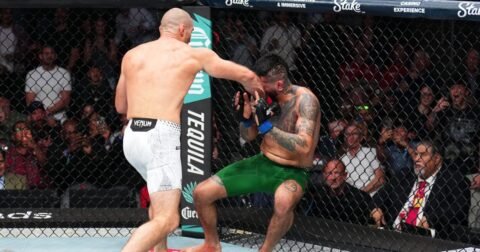Michael Bisping shares a unique perspective on early fights, particularly criticising the impact of a 5 AM start time on a fighter’s performance. The former middleweight champion notably experienced this challenging circumstance during his first title defence at UFC 204, when he faced Dan Henderson at an unusual hour to accommodate American viewers. Bisping’s resilience in that match, which allowed him to triumph despite early setbacks, illustrates his belief that fighters can adapt to any schedule, including the early morning bouts. In contrast, Leon Edwards recently attributed his loss at UFC 304 to the early fight time, stating that it affected his performance against Belal Muhammad. Bisping, however, implies that time is not the enemy, suggesting that to him, the adrenaline of the fight far outweighs any disadvantages associated with a 5 AM fight schedule.
In discussions surrounding match schedules, Michael Bisping’s insights on early morning bouts stand out given his own experiences in the Octagon. The topic of fighting at unconventional times connects to broader conversations about athletic performance, particularly during critical UFC events like title defences. With fighters like Leon Edwards addressing the struggles of competing at early hours, this ongoing dialogue sheds light on the nuances of competition strategy and mental preparation. This raises the question: how do logistical factors, such as fight timing, influence outcomes in high-stakes situations? Bisping’s candid analysis of early fight performances provides a lens through which enthusiasts can better appreciate the complexities of modern mixed martial arts.
Michael Bisping’s Perspective on Early Morning Fights
Michael Bisping has taken a firm stance regarding early morning fights, particularly drawing from his own experiences while competing at a time that many athletes may find challenging. He recalls making history during his title defence at UFC 204 when he fought Dan Henderson at 5 AM, noting that despite the unusual timing, the electric crowd and the adrenaline rush helped him perform at his best. Bisping’s view is that fighters should be prepared to adapt to various circumstances, including fight timings, as they are part of an athlete’s career in the UFC and can happen anywhere around the globe.
In an exclusive interview, Bisping articulated that fighting at inconducive hours doesn’t inherently diminish a fighter’s performance. He likened this to his own ability to push through early knockdowns, affirming that mental preparation plays an equally essential role. He even suggested that the excitement and intensity of fighting before a large audience can outweigh the physical constraints posed by an unconventional fight schedule, implying that while individual experiences may vary, the foundation of professional fighting is resilience and adaptability.
Leon Edwards vs. Belal Muhammad at UFC 304: Lessons Learned
Leon Edwards’ bout against Belal Muhammad at UFC 304 is a significant moment that showcased the impact of early morning fights on performance. While Edwards trained intensely for the scheduled title defence, reports suggest that the fight was hindered by the odd timing, leading to his unexpected loss. This has since prompted Edwards to assert that he will never again accept a fight scheduled at 5 AM, even as he looks to reclaim his title. His focus now is to regain confidence and understanding of his capabilities before stepping back into the octagon.
Despite a disappointing outcome, Edwards reflects on UFC 304 as an educational experience, where he learned how critical fight timing can be to overall performance. Many analysts, including Bisping, argue that while Edwards attributes his defeat to the time, the reality of the fight is more complex. Bisping emphasized that sometimes fighters have off nights, a reminder of the unpredictable nature of mixed martial arts. As Edwards prepares for another fight, it’s crucial for him to focus not just on the hours he fights but also on the mental and physical readiness required to succeed in the octagon.
Michael Bisping’s Enduring Legacy in the UFC
Michael Bisping has left an indelible mark in the UFC, both as a fighter and a commentator. His journey to the middleweight championship was filled with challenges, including fights scheduled at odd hours, which he consistently adapted to. Bisping’s ability to overcome adversity, such as facing Dan Henderson while carrying the weight of past defeats, illustrates his resilience. His insights, especially those shared during UFC London Media Day, provide valuable lessons for current and future UFC athletes, about the mental fortitude required in the sport.
Bisping has transitioned from fighter to analyst, bringing a wealth of experience and perspective to his commentary. His opinions matter in the MMA community, particularly regarding fight strategies and what it takes to succeed under varying circumstances, like early morning schedule fights. By analyzing events such as UFC 304, he provides a lens through which fans and fighters alike can appreciate the intricacies of timing, performance and psychological readiness in the demanding world of mixed martial arts.
UFC Title Defenses: Challenges and Strategies
Defending a UFC championship title is one of the most formidable challenges in MMA, where factors such as timing and mental preparation become crucial. Title defences often come with the pressure of facing up-and-coming challengers while also addressing the unique conditions surrounding the fight, including scheduling. Bisping’s successful defence against Henderson at 5 AM exemplified the mental strength needed to retain a title despite atypical circumstances, serving as a possible blueprint for future title holders on how to handle the unexpected.
For fighters like Leon Edwards, navigating title defences also involves strategizing against opponents who may capitalize on any disadvantages. Edwards’ experience at UFC 304 against Muhammad highlights how fight time can influence performance outcomes. Athletes must be versatile in acclimatizing themselves to different fight environments, understanding that preparation should not only focus on physical training but also on adapting to timing and mental readiness before facing opponents in the octagon.
The Importance of Mental Preparation in UFC
Mental preparation is an often-overlooked aspect of training for UFC fighters, yet it plays a decisive role in performance during fights. Bisping emphasizes the need for fighters to harness the adrenaline and excitement of competing in front of crowds, likening it to a switch that should be activated regardless of the fight time. Mental readiness ensures that fighters can transcend challenging conditions such as early morning matchups and deliver their best performances, akin to what ‘The Count’ achieved during his illustrious career.
Leon Edwards’ experience at UFC 304 serves as a reminder that mental aspects can become a double-edged sword. While he recognizes the value of focusing on technique and training, he has publicly expressed concerns over how mental fatigue from fighting at 5 AM affected his performance. This underscores the importance of psychological resilience, requiring fighters to develop strategies that bolster their mental game, allowing them to confront not just their opponents, but their own internal challenges during critical bouts.
Analyzing UFC 304: The Aftermath and Insights
UFC 304 has generated intense discussions within the MMA community, particularly regarding the implications of fight timing and performance. Leon Edwards’ loss to Belal Muhammad has sparked debates about whether external factors such as early morning starts directly affect an athlete’s outcome. Analysts, including Michael Bisping, offer varying perspectives, with Bisping advocating for the notion that fighters should be ready regardless of when they step into the octagon, thus triggering discussions on athlete conditioning and mental endurance.
The aftermath of UFC 304 compels analysts and fighters to reevaluate the significance of preparation and resilience in high-stakes environments. Bisping’s contrasting opinion highlights that while Edwards’ rationale for his defeat centers around the unusual timing, it is also crucial for each fighter to assess their own mindset leading up to the fight. Ultimately, the insights derived from this event foster a deeper understanding of the intricacies of performance in the UFC, encouraging current champions and contenders alike to prioritize mental acuity alongside physical readiness.
The Fight Schedule Dilemma: 5 AM vs Prime Time
The scheduling of fights at early hours, like 5 AM, raises crucial questions regarding athlete performance, training regimens, and public interest. Bisping’s own experience has shown that while early morning fights can be daunting, champions are expected to adjust to whatever time their bouts are scheduled for. The apparent clash between fighter preferences and promotional needs underlines the complexities of logistics in setting UFC events, particularly concerning pay-per-view market demands.
On the flip side, Leon Edwards’ reluctance to accept future 5 AM fights showcases the increasing importance of fighter sentiment in scheduling discussions. The push for prime-time events is reflected in the MMA landscape, where fan engagement and viewership are paramount. As fighters navigate these challenges, their experiences serve as noteworthy examples of how crucial timing can be in the unpredictable world of professional MMA, influencing both outcomes and careers in the UFC.
Future Implications for Leon Edwards’ Career
Leon Edwards is now at a pivotal point in his career following his defeat at UFC 304. As he approaches his next fight, the lessons learned from his early morning contest will undoubtedly stay with him. Moving forward, Edwards must channel the insights gained—not only about fights scheduled at 5 AM but also about enhancing his overall performance. As he prepares to potentially reclaim the championship, his next steps will be crucial in redefining his approach to training and mental preparation.
Additionally, Edwards’ public declaration to avoid early morning fights exemplifies a wider discussion within the MMA fraternity regarding the importance of fighter preferences in scheduling. If fighters like Edwards begin to advocate for prime-time slots consistently, we may see the UFC adapt fight schedules to better accommodate the athletes. This delicate balance between promotional interests and fighters’ well-being will shape the future landscape of the UFC, sparking an evolution in how events are scheduled moving forward.
The Evolution of Fight Timing in the UFC
The evolution of fight timing within the UFC reflects broader trends in professional sports, where athlete performance and fan engagement are increasingly considered in scheduling decisions. Historically, events have often been tailored to cater to international audiences, sometimes leading to challenges for fighters in aligning their internal clocks. Bisping’s and Edwards’ experiences highlight the multifaceted nature of fight timing, revealing how critical it is for both athletes and promoters to navigate the intricacies of global broadcasting.
As the sport continues to grow, it is crucial for the UFC to consider the personal experiences of fighters like Bisping and Edwards. Their feedback should lead to a more athlete-centric approach to scheduling, ensuring that fight times allow competitors to perform at their peak. By understanding the various factors that influence performance outcomes, the UFC can enhance athletes’ experiences while maximizing audience engagement worldwide, paving the way for a more sustainable future for the sport.
| Key Point | Details |
|---|---|
| Bisping’s Stance on Early Fights | Bisping argues that fighting at 5 AM is not an issue and believes that adrenaline takes over regardless of the time. |
| Leon Edwards’ Experience | Edwards performed poorly at UFC 304 against Belal Muhammad, attributing his loss in part to the early fight time. |
| Comparing Experiences | Both fighters had significant title matches at 5 AM, but while Bisping thrived, Edwards struggled. |
| Bisping’s View on Edwards’ Explanation | Bisping respects Edwards’ feelings but believes the timing can’t solely be blamed for a poor performance. |
| Upcoming Fight | Leon Edwards will fight Sean Brady at a prime time slot, which Bisping believes will benefit him. |
Summary
Bisping’s opinion on early fights reveals a significant divergence from that of Leon Edwards. While Edwards feels that fighting at 5 AM contributed to his loss against Belal Muhammad, Bisping maintains that the time of day should not hinder performance. According to Bisping, the excitement and adrenaline of fighting in front of a large crowd can mitigate any issues related to fight timing. As Edwards prepares for a prime time matchup with Sean Brady, Bisping expresses optimism for his performance, emphasizing that different fighters react uniquely to the pressures of competition.







